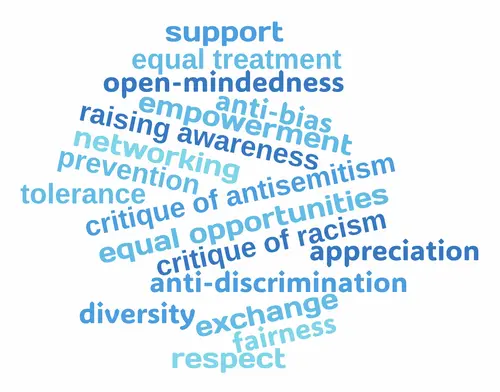Preventing Racism and Antisemitism (PRA)
Shaping a Cosmopolitan University of Bamberg
The University of Bamberg advocates for open-mindedness, tolerance, and an appreciation for human diversity. The university opposes racist, antisemitic, and anti-democratic hostility and works toward a respectful, open-minded environment for teaching, studying, research, work, and university life. As stated in its Diversity Strategy, the university is committed to fighting existing types of discrimination, supporting those affected by discrimination, and shouldering its societal responsibility for fostering diversity.
Raising Awareness against Racism and Antisemitism
In order to achieve those goals, the university is enhancing its preventative initiatives against racism and antisemitism. Training courses, workshops, roundtables, and other events are planned to raise all university members' awareness against everyday, institutional, and systemic racism and antisemitism. With a critical eye toward its function and workings as an educational and research institution, the University of Bamberg strives for a safe environment, free from discrimination, that facilitates fruitful academic exchange and compassionate cooperation.
The STIBET-Program of the German Academic Exchange Service - Deutscher Akademischer Austauschdienst (DAAD) is supporting the university's work against racism and antisemitism. A concept for sustainable preventative measures, also in view of the university's international welcoming culture, is being developed.
Latest News
Contact Points
at the University of Bamberg
- The Anti-Discrimination Office at the University of Bamberg provides strictly confidential counseling.
- The directive "Grenzen wahren" determines measures and procedures for prevention as well as intervention.
outside of the university
- The antidiscrimination facility „Füreinander" in Upper Franconia offers support and counseling for the entire region.
